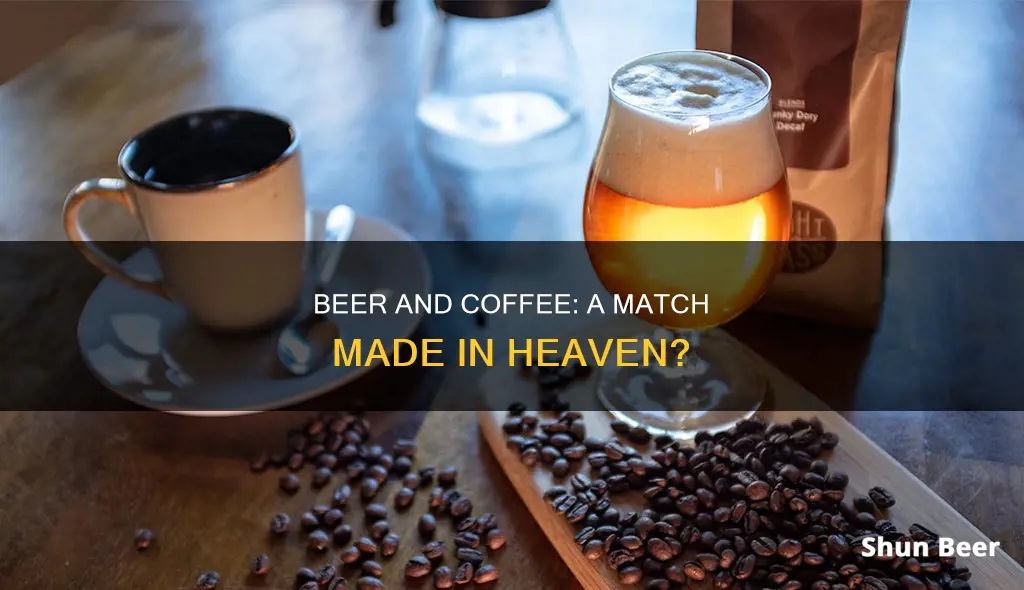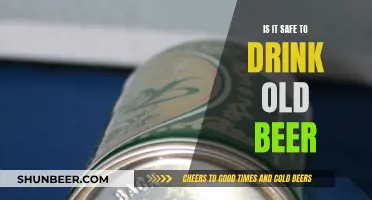
Coffee and beer are two of the world's most popular drinks, with more Americans drinking coffee than beer. While drinking them together may seem like an unusual combination, it is becoming increasingly common, with some breweries even adding coffee to their beers. However, the more well-known combination is that of alcohol and caffeine, which has become a growing trend among young adults. While this may give drinkers a pleasant buzz, it is a combination that experts generally advise against.
| Characteristics | Values |
|---|---|
| Recommended | No |
| Safe | No |
| Effects | Caffeine masks the effects of alcohol, making you feel more alert and capable than you are. This can lead to drinking more alcohol than normal, increasing the risk of alcohol poisoning, binge drinking, and engaging in dangerous behaviours. |
| Health Risks | Raised blood pressure, increased risk of stroke, heart attacks, irregular heartbeats, anxiety, sleep issues, dehydration, alcohol-induced injuries, accidents, and alcohol poisoning. |
What You'll Learn

Mixing beer and coffee may lead to heightened anxiety
Caffeine can mask the effects of alcohol, making you feel more alert and capable than you actually are. This can lead to drinking more alcohol than intended, which can have serious consequences. Alcohol poisoning is always an emergency and requires immediate medical attention. Mixing alcohol and caffeine can also increase the risk of alcohol-related incidents, such as riding with a drunk driver, becoming injured, or experiencing unwanted sexual advances.
In addition to the increased risk of injury and alcohol poisoning, mixing beer and coffee can also disrupt your sleep patterns. Caffeine blocks sleep-inducing receptors in the brain and interferes with the body's circadian rhythm, while alcohol can create long-term sleep issues and disorders such as insomnia, sleep paralysis, and sleep apnea. This irregular sleep schedule, caused by the combination of alcohol and caffeine, can lead to other heart conditions.
People who are sensitive to stimulants should be especially cautious when it comes to mixing beer and coffee. While alcohol initially relaxes you, the body works hard to metabolize it, and the aftermath can be anxiety-inducing. Adding caffeine to the mix, which can also heighten anxiety, could lead to a state of heightened anxiety and panic.
Overall, it is essential to proceed with caution when mixing beer and coffee. While an occasional combination may not cause harm, excessive consumption can lead to dangerous consequences. It is important to monitor your alcohol intake and be aware of the potential risks involved.
Texas Teen Beer Laws: What's Allowed?
You may want to see also

It can cause an irregular heartbeat
Coffee and alcohol are common triggers of an irregular heartbeat, also known as an arrhythmia. This can feel like a fluttering or racing heart and may be a sign of heart disease. However, according to the American Heart Association, most arrhythmias are harmless.
When consumed together, caffeine and alcohol can have a detrimental impact on the body. Coffee is a stimulant that increases activity in the brain and makes you feel more energetic and
In addition, caffeine can mask the effects of alcohol, making individuals feel less drunk than they actually are. This can lead to drinking more alcohol, increasing the risk of alcohol poisoning and alcohol-induced injuries. Furthermore, combining alcohol and caffeine can increase the risk of binge drinking, especially in individuals between the ages of 15 and 23.
While caffeine and alcohol can have negative interactions, recent research suggests that caffeine consumption in moderate amounts, about 400 mg per day or around four to five cups of coffee, does not provoke arrhythmias. However, some individuals may be more sensitive to caffeine and experience palpitations or worsening of existing heart conditions. Therefore, it is important to monitor how caffeine makes you feel and adjust your consumption accordingly.
Overall, while drinking coffee and beer simultaneously may not directly cause an irregular heartbeat, it can increase the risk of other cardiovascular issues and negatively impact overall heart health. It is always best to consult with a doctor to determine safe consumption levels for your specific health needs.
Craft Beer Festivals: All-You-Can-Drink Events?
You may want to see also

It may lead to binge drinking
Drinking beer and coffee together can lead to binge drinking, which is a serious issue with potentially fatal consequences. Binge drinking is defined as consuming a certain number of alcoholic drinks within a two-hour period: for men, it's five or more drinks, and for women, it's four or more. This kind of heavy drinking has been linked to numerous health risks and negative outcomes.
Firstly, caffeine can mask the effects of alcohol, leading to overconsumption. Caffeine, a stimulant, increases alertness and energy, while alcohol, a depressant, slows down brain activity and causes loss of motor control and lack of concentration. When combined, these opposing effects can be misleading, making individuals feel less drunk than they actually are. As a result, they may continue drinking, leading to binge drinking and associated dangers such as alcohol-induced injuries, accidents, or poisoning.
The combination of beer and coffee also increases the likelihood of heavy drinking, alcohol dependence, and physical harm. Individuals who mix alcohol and caffeine are more likely to binge drink and develop alcohol use disorders. This is especially true for those with a family history of alcohol addiction. Binge drinking can lead to alcohol poisoning, which can be fatal, as well as other physical and mental health issues.
Additionally, drinking beer and coffee together can result in increased risky behaviours and negative consequences. Studies have shown that students who regularly consumed energy drinks were more likely to have alcohol-related incidents, such as riding with a drunk driver or becoming injured. Mixing alcohol and caffeine has also been linked to a higher chance of sexual assault, both as a victim and a perpetrator.
Furthermore, the diuretic effects of both alcohol and caffeine can lead to dehydration, causing adverse effects such as dry mouth, thirst, dizziness, and poor kidney function. Caffeine can also worsen hangover symptoms and prolong them by dehydrating the body.
In conclusion, drinking beer and coffee together can lead to binge drinking through the masking of alcohol's effects, increased likelihood of heavy drinking and alcohol dependence, and the encouragement of risky behaviours. The potential consequences of binge drinking are severe and can be life-threatening. Therefore, it is essential to be aware of the risks associated with mixing alcohol and caffeine and to consume these beverages responsibly and in moderation.
Beer and Atkins: What You Need to Know
You may want to see also

It can increase the risk of alcohol poisoning
Drinking beer and coffee together can increase the risk of alcohol poisoning. Alcohol poisoning is a life-threatening condition that occurs when there is so much alcohol in the bloodstream that areas of the brain controlling basic life-support functions, such as breathing, heart rate, and temperature control, begin to shut down. Caffeine can mask the effects of alcohol, making individuals feel more alert and less drunk than they actually are. This can lead to drinking more alcohol than usual, increasing the risk of alcohol poisoning.
The masking effect of caffeine on alcohol can lead to drinking more than intended, which is a major risk factor for alcohol poisoning. When an individual consumes more alcohol than their body can handle, certain areas of the brain start to shut down, including those responsible for vital functions such as breathing, heart rate, and consciousness. This condition, known as alcohol poisoning, can be fatal and requires immediate medical attention.
Caffeine and alcohol have opposing effects on the body, with caffeine acting as a stimulant and alcohol as a depressant. When consumed together, these opposing effects can counteract each other, leading to increased alertness and a reduced perception of intoxication. As a result, individuals may continue drinking, causing their blood alcohol level to rise to dangerous levels.
The combination of caffeine and alcohol can also increase the likelihood of binge drinking, which is a significant risk factor for alcohol poisoning. Binge drinking is defined as consuming four or more drinks for females or five or more drinks for males in a short period, typically about two hours. The high caffeine content in energy drinks, combined with alcohol, has been found to increase the risk of binge drinking, especially among individuals aged 15 to 23.
Additionally, drinking coffee after a night of alcohol consumption can also prolong or exacerbate hangover symptoms. Caffeine can dehydrate the body, and when combined with the diuretic effects of alcohol, it can further contribute to dehydration, leading to symptoms such as dry mouth, thirst, dizziness, and adverse effects on the skin and kidneys.
Beer and Calcium: What's the Connection?
You may want to see also

It can cause dehydration
Mixing caffeine and alcohol can lead to dehydration, which can have adverse effects on the skin and body. Dehydration can cause poor kidney function, muscle cramping, shrunken blood vessels in the brain, and confusion in moderate to severe cases.
Caffeine and alcohol are both diuretics, which means they cause you to urinate more frequently. If you don't drink water while consuming these beverages, you may become dehydrated. Dehydration can be characterised by a dry mouth, thirst, and feelings of lightheadedness or dizziness.
Drinking coffee when you have a hangover could make you feel more alert, but it may also worsen your symptoms or prolong them because it can dehydrate your body.
Additionally, the stimulating effects of caffeine can mask the depressant effects of alcohol. This may lead to drinking more alcohol than usual, further increasing the risk of dehydration.
To avoid dehydration, it is important to consume water along with caffeine and alcohol. It is also recommended to avoid mixing these two substances, as it can lead to dangerous consequences.
Beer and Fruit: A Refreshing Combination?
You may want to see also
Frequently asked questions
Mixing beer and coffee is generally not recommended. Caffeine can mask the effects of alcohol, making you feel more alert and capable than you are, which can lead to drinking more alcohol than intended. This can increase the risk of alcohol poisoning, binge drinking, and other dangerous behaviours.
Mixing beer and coffee can lead to heightened anxiety, binge drinking, and an increased risk of injury. It can also affect your heart and the chemicals in your brain that regulate sleep. Mixing these two substances can also cause dehydration, which can lead to dizziness and lightheadedness.
Some people may enjoy the taste of mixing beer and coffee, such as in an espresso martini or Irish coffee. Mixing these two substances may also provide a boost of energy, making you feel more alert and energetic.
If you want to avoid the potential negative consequences of mixing beer and coffee, you can try having a non-caffeinated beverage with your beer, or drinking coffee on its own. It is important to be mindful of your consumption and to avoid excessive drinking, as this can lead to negative health effects.







